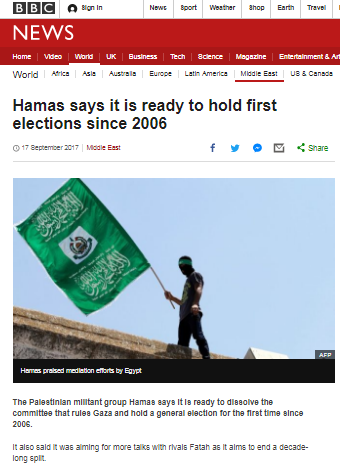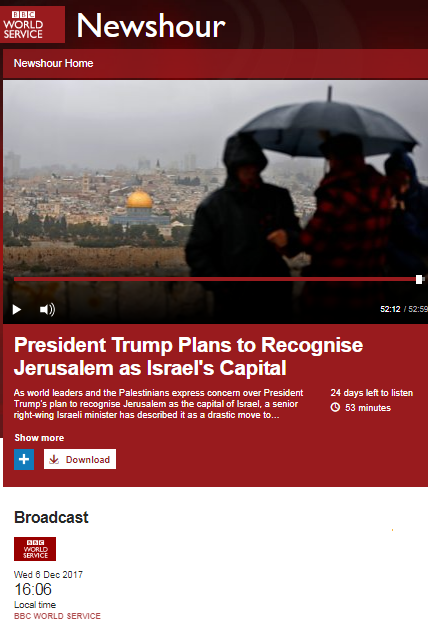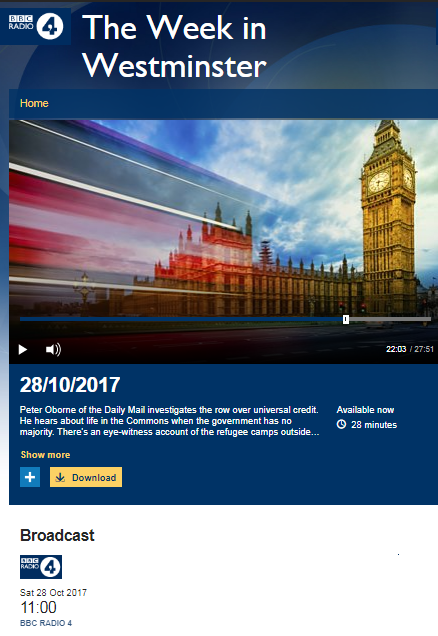Visitors to the BBC News website’s Middle East page on September 17th found the headline “Hamas says it is ready to hold elections” under which they were told that:
“The Palestinian militant group signals it is ready to end its feud with Fatah and hold elections”.
The link leads to a similarly titled report – “Hamas says it is ready to hold first elections since 2006” – which in its original version included closing sentences wrongly implying that the policy document published by Hamas in May replaces its 1988 charter.
The current version of the report includes statements that – in light of the BBC’s chronic avoidance of coverage of internal Palestinian affairs – audiences may have had difficulty following.
“The Palestinian militant group Hamas says it is ready to dissolve the committee that rules Gaza and hold a general election for the first time since 2006.”
BBC audiences were not told of the creation of that ‘administrative committee’ earlier this year or of the significance of that move by Hamas in prompting Mahmoud Abbas’ subsequent financial sanctions against the Gaza Strip.
“Fatah’s deputy leader Mahmoud al-Aloul gave a tentative welcome to the news and called for other issues to be resolved, including control of border crossings.”
BBC audiences were not informed of the election of al-Aloul to the position of vice-chair of Fatah in February.
A series of Palestinian ‘unity governments’ – or proposals for them – have repeatedly come to a swift end in the past but the BBC’s report includes just one opaque sentence on a factor of prime importance to audience understanding of the significance of this latest announcement from Hamas.
“It is not yet clear whether Hamas is ready to place its security forces under Mr Abbas’s control – a major sticking point in the past, Associated Press reports.”
Exactly three years ago a BBC report on the ‘unity government’ of the time included a very similar statement:
“However, a Hamas official told the Associated Press that there were still disagreements over who should be responsible for paying civil servants in Gaza, and whether the PA’s own security forces would be allowed a significant presence in the territory. He described the deal as “partial”.” [emphasis added]
Now as then, the BBC makes no effort to clarify to its audiences that any ‘unity government’ which refrained from disarming Hamas’ terrorist militia in the Gaza Strip would fail to meet the Palestinian Authority’s commitments under existing agreements with Israel.
Neither does it inform readers that if Hamas and other terrorist groups are not disarmed by a PA ‘unity government’ and the territory not brought under the sole control of PA security forces, then the Gaza Strip – along with the rest of the PA-controlled areas – will find itself in a ‘Lebanon-style’ situation whereby the actions of a foreign-sponsored terrorist organisation can continue to spark conflict whenever that suits its own (or its sponsor’s) agenda.
Another important aspect of this story is pointed out at the Times of Israel:
“The main problem with the timing from Fatah’s point of view is that in three days, Abbas is due to meet with Trump on the sidelines of the United Nations General Assembly in New York.
One can only imagine how Abbas’s meeting with the United States president will be perceived if he will have just agreed to form a national unity government with a terror group, and especially if he speaks about reconciliation with Hamas in his UN address.
Abbas will want answers from Trump about his administration’s as-yet-unstated commitment to a two-state solution. It would be odd for Abbas to talk up a Palestinian state after agreeing to share power with a group that calls for the destruction of Israel.”
It was of course Abbas’ decision to opt for ‘reconciliation’ with Hamas in April 2014 which brought months of talks between Israel and the Palestinians to an end.
As was the case when the last ‘unity government’ failed to get off the ground three years ago, once again we see that the BBC’s superficial reporting on a potential Hamas-Fatah reconciliation falls far short of providing its funding public with comprehensive information needed to understand the story.
Related Articles:
BBC fails to clarify to audiences significance of PUG failure to disarm Hamas
Dumbed down BBC reporting on the Palestinian Unity Government continues




